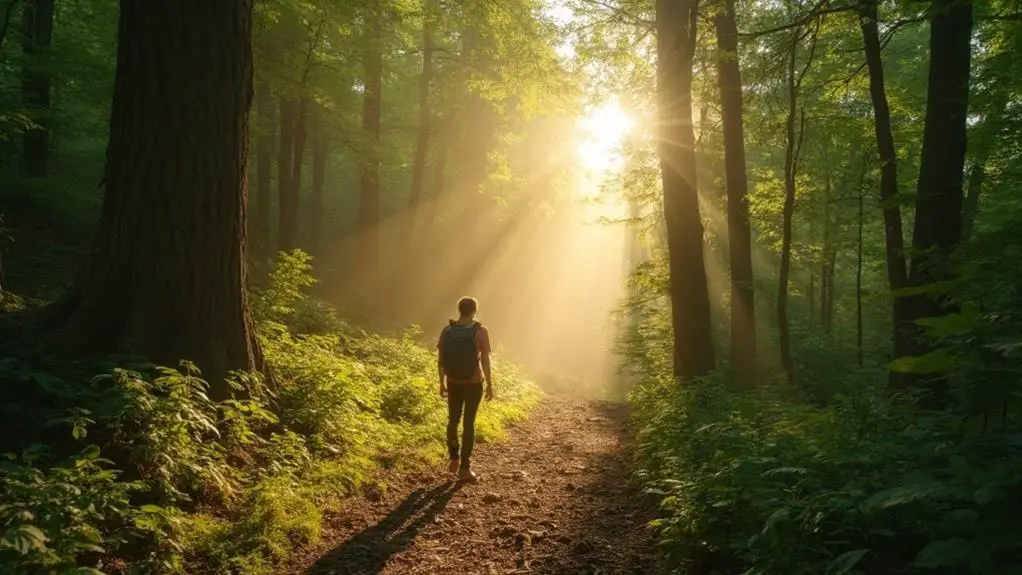Hiking improves mental health by leveraging the therapeutic effects of nature. Clinical studies indicate it alleviates anxiety and depression, considerably by reducing cortisol levels, a primary stress biomarker. Engaging in natural settings for at least 120 minutes weekly correlates with enhanced emotional well-being and reduced risk of mood disorders. Cognitive enhancements from nature immersion include improved attention, memory, and increased creativity. In addition, regular hiking fosters psychological resilience and longevity by promoting cardiovascular health. From an ecotherapeutic standpoint, hiking acts as a non-invasive intervention with transformative mental health benefits. Explore the interconnected science to understand these effects in detail.
Key Takeaways
- Hiking in nature reduces anxiety and depression through endorphin release and cortisol level reduction.
- Exposure to natural environments boosts cognitive functions, including attention and memory, aiding mental clarity.
- Regular hiking promotes emotional well-being by enhancing mood stability and reducing stress.
- Immersion in green spaces correlates with improved cardiovascular health and better sleep quality.
- Group hiking fosters social connections, mitigating loneliness and enhancing psychological well-being.
Benefits of Hiking for Mental Health
When considering the multifaceted benefits of hiking for mental health, it becomes evident that engagement with natural environments plays an essential role in alleviating symptoms of anxiety and depression. Empirical studies underscore that even brief exposure—approximately 20 minutes—of hiking can considerably raise mood and mental clarity.
The physiological mechanisms behind these hiking benefits include increased physical activity levels, which facilitate endorphin release. Endorphins, as endogenous opioid neuropeptides, engender feelings of well-being and act as natural stress mitigators, thereby diminishing anxiety and depressive symptoms.
Further, the immersion in nature inherent to hiking is correlated with reduced cortisol levels, a key biomarker of stress. Lower cortisol concentrations contribute to decreased physiological stress responses, underscoring the therapeutic potential of hiking as a natural intervention for stress-related conditions.
Additionally, the long-term mental health benefits are considerable; individuals who regularly engage in hiking exhibit a markedly reduced risk of mood disorders. This is indicative of hiking's capacity not only to provide immediate relief from psychological symptoms but also to promote enduring mental resilience.
Such evidence supports the advocacy of hiking as a viable component of mental health treatment strategies.
Cognitive Enhancements From Nature

Engaging with natural environments through activities like hiking has been shown to considerably boost cognitive functions, including attention, memory, and clarity of thought. Empirical studies support that exposure to nature facilitates attention restoration, a process by which the brain recovers from mental fatigue, thereby enhancing focus and concentration. This restoration is essential in an era where digital distractions are rampant, often leading to cognitive overload.
Hiking, as a nature-based activity, not only improves attention but also enhances cognitive flexibility, allowing individuals to adapt their thinking to new and unexpected scenarios more effectively.
Furthermore, the link between hiking in natural settings and reduced rumination is significant. By diminishing excessive focus on negative thoughts, individuals can experience clearer mental states conducive to problem-solving and creative thinking. Research also indicates that children in greener neighborhoods, with more opportunities for hiking, have a reduced risk of developing mental disorders, underscoring the long-term cognitive benefits of nature exposure.
Increased creativity and innovative thinking are also associated with outdoor activities, as nature stimulates brain activity in unique ways.
Therefore, integrating hiking into regular routines could offer a natural, accessible means of enhancing cognitive health and performance.
Emotional Well-being and Stress Relief
The cognitive benefits of hiking in natural environments seamlessly extend to improvements in emotional well-being and stress relief. Empirical evidence supports that hiking considerably reduces cortisol levels, thereby mitigating stress. Mindful walking in nature encourages individuals to focus on present experiences, promoting a connection with the environment that enhances emotional regulation. This nature connection is essential as it not only raises mood but also alleviates anxiety and depression symptoms. Research indicates that even a brief 20-minute outdoor experience can lead to notable improvements in emotional state.
Furthermore, regular hiking is correlated with improved mental health outcomes, with a minimum of 120 minutes per week linked to lower incidences of mental health issues. The dual impact of physical activity combined with natural exposure during hiking fosters relaxation and boosts self-esteem, laying the groundwork for long-term emotional resilience.
The sensory experiences inherent in hiking—such as the auditory stimuli from wildlife and visual stimuli from greenery—play a pivotal role in enhancing feelings of calmness and joy. These sensory inputs further solidify the therapeutic effects of nature, making hiking a potent intervention for emotional well-being and stress management.
Ecotherapy and Long-term Health

Ecotherapy, encompassing activities such as hiking, has been empirically validated to alleviate symptoms of mild to moderate depression, underscoring its potential as a non-invasive intervention for mental health enhancement.
The correlation between regular exposure to green spaces and decreased depression risk points to nature's role in promoting longevity and physical wellness, as evidenced by longitudinal studies linking proximity to parks with increased lifespan.
Additionally, research indicates that a minimum of 120 minutes per week spent in natural settings can yield substantial health benefits, including stress reduction and improved mood, thereby supporting both immediate and sustained mental health improvements.
Ecotherapy's Health Benefits
Nature-based interventions, such as ecotherapy, have emerged as effective tools in the domain of mental health care, offering substantial benefits for long-term psychological well-being.
Ecotherapy techniques, including nature immersion through activities like hiking, have been empirically validated to alleviate symptoms of mild to moderate depression and anxiety. Research underscores that engaging in natural environments for at least 120 minutes weekly is instrumental in enhancing mental health outcomes and mitigating the risk of depressive disorders.
The physiological underpinnings of ecotherapy's efficacy are multifaceted. Regular outdoor activities like hiking are correlated with improved cardiovascular health, bolstered immune function, and enhanced sleep quality, all of which are essential to sustaining mental health.
In addition, nature immersion contributes to significant stress reduction, as evidenced by decreased cortisol levels, facilitating relaxation and better emotional regulation.
Alongside physiological and psychological benefits, ecotherapy also promotes social and existential dimensions of health. Participating in conservation-related hiking activities fosters a sense of community and purpose, vital elements in addressing anxieties associated with climate change.
Collectively, these aspects highlight ecotherapy as a holistic intervention, integrating physical, emotional, and social benefits to support enduring mental wellness.
Nature's Impact on Longevity
Incorporating regular exposure to green spaces into daily life, such as through hiking, exerts a measurable impact on human longevity. Nature immersion has been shown to confer numerous longevity benefits, primarily by reducing the incidence of mental health disorders like depression and anxiety, which are known to adversely affect lifespan.
The presence of green spaces is linked to fewer physical health issues, with studies illustrating a correlation between proximity to nature and extended lifespans.
Key elements contributing to the longevity benefits of nature immersion include:
- Physical Health Enhancement: Engaging in activities such as hiking aids in weight management, strengthens cardiovascular health, and boosts immune function.
- Mental Health Improvement: Regular nature immersion is associated with considerably lower risks of depression and anxiety, enhancing life satisfaction.
- Social Connectivity: Hiking fosters social interactions and community bonds, which are vital for psychological well-being and longevity.
- Time Requirement: Research advocates for spending at least 120 minutes weekly in natural settings to optimize both mental and physical health.
These insights underscore the essential role of ecotherapy in promoting long-term health.
Green Spaces and Wellness
The intricate relationship between nature and human longevity naturally extends to the broader concept of wellness, where green spaces serve as a fundamental component. Empirical evidence underscores that regular engagement with green spaces, such as parks and forests, considerably reduces depression and anxiety levels. A consistent interaction of at least 120 minutes weekly in nature correlates with enhanced health and well-being. This interaction is facilitated through ecotherapy, encompassing activities like hiking and gardening, which clinically alleviate symptoms of mild to moderate depression and anxiety.
In terms of green space design, the strategic development of accessible natural environments plays a pivotal role in promoting mental health. Individuals residing near parks exhibit lower stress levels and improved emotional well-being compared to those with limited access, highlighting the inverse correlation between natural environments and mental health risks.
Additionally, community engagement in outdoor activities fosters long-term mental health improvements, with participants reporting heightened life satisfaction and diminished loneliness.
Investment in green infrastructure, such as trails and community gardens, not only promotes wellness but also yields substantial economic benefits. For every dollar allocated to nature-related initiatives, there is a return of nearly three dollars in medical savings, underscoring the economic efficacy of fostering green space access.
Urban Challenges and Nature Access

Urban environments present unique challenges that considerably impact access to nature, a factor critically linked to mental health outcomes. Evidence suggests that urban living correlates with a 40% increased risk of depression and over 20% heightened anxiety compared to rural settings, primarily due to restricted nature access.
Systemic barriers such as economic disparities and physical accessibility issues further exacerbate this inequity, underscoring the urgent need for solutions that promote equitable access to nature.
Key elements contributing to these challenges include:
- Urban Greenways: Effective urban planning should incorporate greenways to connect residents with nature, enhancing community health.
- Economic Disparities: Lower-income neighborhoods frequently lack adequate green spaces, amplifying mental health disparities.
- Physical Accessibility: Infrastructure limitations often prevent easy access to existing natural areas, limiting their benefits.
- Safety Concerns: High crime rates and overcrowding diminish opportunities for safe outdoor activities, increasing urban stress.
Advocacy for equitable access to quality natural environments is imperative. Research indicates that proximity to parks and green spaces is associated with reduced stress and improved mental health, emphasizing the importance of integrating nature into urban planning.
Practical Hiking Tips for Mental Health

Engaging in regular hiking activity offers a practical approach to enhancing mental health, serving as a natural intervention to alleviate stress and anxiety. Clinical evidence suggests that dedicating at least 120 minutes weekly to outdoor activities such as hiking can considerably reduce stress levels and anxiety while enhancing overall mental well-being.
To maximize these benefits, incorporating mindful hiking practices is vital. This involves consciously focusing on sensory experiences, such as the sounds of birds or the texture of the terrain, thereby fostering a deeper emotional connection with nature.
Selecting trails that align with one's fitness and comfort is important. Varying trail difficulties not only account for physical abilities but also help in amplifying the mental health advantages derived from physical exertion.
Additionally, the social aspect of hiking should not be overlooked. Participating in group outings can strengthen social bonds, mitigating loneliness and contributing positively to mental health outcomes.
Establishing a routine with regular hiking trips guarantees consistent exposure to natural environments, which is linked to sustained improvements in mood and cognitive functions.
Hence, mindful hiking combined with social interactions and regular nature exposure forms a thorough strategy for improved mental health.
Personal Stories of Transformation

Numerous personal accounts underscore the calming influence of nature experienced through hiking, where individuals report substantial reductions in anxiety and depression following exposure to natural settings.
These narratives often highlight how the serene environment facilitates a shift in perspective, allowing for enhanced self-reflection and mindfulness that contribute to improved mental health outcomes.
Additionally, the act of hiking not only supports emotional well-being but also inspires increased creativity and problem-solving abilities, as individuals discover new ways of engaging with their surroundings.
Nature's Calming Influence
The anecdotal evidence from hikers underscores a profound psychological shift attributed to regular immersion in nature, revealing a remarkable decline in symptoms of anxiety and depression. Such nature immersion involves active sensory engagement, where individuals report feeling more grounded and present.
Research corroborates these personal accounts, indicating that even a brief 20-minute exposure to natural settings can considerably uplift mood and mitigate stress. This immediate emotional relief is often described by hikers as a tangible sense of calmness and improved mental clarity.
The physiological underpinnings of this calming influence are linked to measurable reductions in cortisol, a stress hormone. By lowering cortisol levels, hiking promotes a state of relaxation and well-being.
Personal stories of transformation illustrate the multifaceted benefits of hiking:
- A serene landscape transforming anxiety into tranquility
- The rhythmic sound of footsteps on a forest path easing tension
- A canopy of trees providing shelter from both sun and stress
- The scent of pine invigorating the senses, fostering mindfulness
Moreover, the sense of community among hiking groups plays a critical role in alleviating loneliness, further enhancing overall life satisfaction. In this way, nature's therapy extends beyond individual experience, fostering collective well-being.
Discovering New Perspectives
While nature's calming influence provides immediate emotional relief, the long-term engagement with hiking offers profound personal transformations. Personal accounts frequently highlight significant perspective shifts experienced through regular hiking. These shifts are often attributed to the dual influence of nature insights and the physical activity inherent in hiking. Individuals report improved moods and reduced anxiety, with transformative moments of clarity emerging during their time on the trails. Such experiences are corroborated by studies indicating that immersion in natural environments enhances cognitive function and creativity.
Moreover, the communal aspect of hiking cannot be underestimated. Participants in group hikes often articulate a newfound sense of belonging and community, which plays a vital role in mitigating feelings of loneliness and isolation. This social connection, combined with nature insights gained on the trails, contributes positively to overall mental health. Research suggests that dedicating at least 120 minutes per week to hiking is associated with lower levels of depression and anxiety, underscoring its therapeutic potential.
Personal stories further reveal that hiking encourages self-reflection and mindfulness. This process fosters emotional well-being and resilience, as individuals develop a deeper connection with nature, leading to sustainable mental health benefits over time.
Frequently Asked Questions
How Does Nature Therapy Help Mental Health?
Nature immersion yields psychological benefits by reducing stress and anxiety levels, enhancing cognitive function, and promoting emotional resilience. Clinical evidence supports its efficacy in treating mild to moderate mental health issues, facilitating improved mood and physiological relaxation.
How Does Walking in Nature Improve Mental Health?
Mindful walking in nature, enriched by sensory experiences, clinically improves mental health by reducing rumination, enhancing mood, and lowering cortisol levels. Evidence demonstrates increased alpha wave activity, promoting relaxation and cognitive function, thereby reducing anxiety and depression symptoms.
How Does Hiking Reduce Anxiety?
Hiking reduces anxiety by integrating mindfulness practice and stress reduction benefits, as exposure to natural environments activates brain areas linked to emotional regulation, lowers cortisol levels, and enhances mood, thereby mitigating anxiety symptoms and promoting mental well-being.
How Does Exercise Improve Mental Health Scientifically?
Exercise improves mental health by facilitating endorphin release, which enhances mood and reduces stress. It also boosts cognitive function through increased blood flow and neurogenesis, mitigating symptoms of anxiety and depression, supported by substantial empirical evidence.
Conclusion
The evidence underscores hiking as a potent intervention for mental health improvement, offering cognitive enhancements and emotional well-being. The therapeutic effects of nature, supported by ecotherapy research, demonstrate significant stress relief and long-term health benefits. Urban environments pose challenges to nature access, yet practical strategies can mitigate these barriers. Personal narratives further validate hiking's transformative impact. Continued exploration into structured ecotherapy programs and urban accessibility is essential to maximize the mental health benefits of hiking.